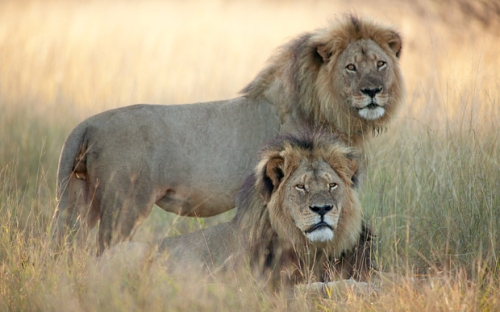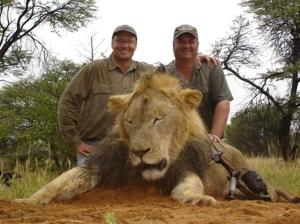
Cecil (lying down) and Jericho, two named lions in Hwange National Park in Zimbabwe. Photo: Brent Stapelkamp
My Facebook just pretty much exploded with photographs of Cecil, the GPS-collared male lion who was baited out of Hwange National Park in Zimbabwe this month, shot, skinned, and beheaded so that a dentist from Minnesota could have something pretty on his wall.
Okay, it was terrible, it was stupid, let’s all fantasize about hideous fates befalling the hunter and the horrible guides who helped him do it. Now, look past that for just a moment. Approximately 655 lion trophies, perhaps more — each one shot, skinned, and beheaded — are exported from Africa every year. The same tragedy which befell Cecil happens, on average, nearly twice a day. Why does only Cecil’s death deserve global attention?
I’m not ripping on anyone supporting justice for Cecil; it’s an honest question, and I feel that answering it could bring us closer to finding out what it is that makes people commit offenses like this one. Cecil appears to “matter more” than the other lion likely killed elsewhere for the same reason the same day, or the fourteen other lions killed that week, because he has a name. A beautiful adult male trackable via his collar and identifiable by a distinctive, dark mane, he was photographed often and was familiar with, and to, visitors. No doubt nameless when young, over time, with familiarity, he became Real, like the Velveteen Rabbit. The mechanism by which this happens — by which humans bond with an animal sufficiently to imbue it with a perceived personality*, most visibly manifested in a name — is the same mechanism which creates vegetarians, pet owners and animal shelter workers. I believe that failure of this mechanism is where we get people like the trophy-hunting dentist, who said:
“I had no idea that the lion I took was a known, local favorite, was collared and [was] part of a study until the end of the hunt.”

This lion, killed previously by the same man, does not have a name. Did you hear about this lion’s death on the news? Source: NY Daily News
He was perfectly happy to “[pursue] an activity I love and practice responsibly and legally” until he found out the lion had a name. Likewise, most of us were much less interested in him and his hobby until we found out the lion had a name. Compare the reaction of people to the 19-year-old who posted photos of herself with unnamed trophy animals (including a lion) in 2014 to the backlash coming at Cecil’s killer today. The 19-year-old blipped across my screen. The dentist has held top billing for several days.
Serial killers do not relate to their victims as other people; they must “depersonalize” them before committing atrocities upon them. Scientists do not name their laboratory animals. (Part of why Jane Goodall’s research was considered so groundbreaking is that she did name the chimps, which was considered scandalously unprofessional at the time.) Likewise, while dairy cows (who can live with their humans for years) sometimes have names; beef cattle (eaten after 18 months) generally do not. Factory farmed animals do not have names. (These animals all get identification numbers, which is a practice we’ve seen elsewhere as well, and for remarkably similar reasons.) And hunters rarely name their targets (with some notable exceptions, such as “Old Three Toes“).
Looking at it the other way, when did you last see a pet owner whose dogs were named 1, 2, and 3? Animal shelters name their animals, even if the animals also receive ID numbers. Show and race horses are named. Zoo animals (at least the “charismatic megafauna“) are named. Animals on television are named. And individual wild animals which are somehow distinctive, like Cecil, can become named. This makes them Real.
We do not hold the same love for “tigers” that we do for Tigger; we do not hold the same love for “wolves” that we do for the Sawtooth Pack; we do not hold the same love for “lions” that we do for Cecil. German Shepherds and collies were generic until we met Rin Tin Tin and Lassie.
From Names and Personal Identity, by H. Edward Deluzain:
“[The] bestowal of name and identity is a kind of symbolic contract between the society and the individual. …by giving a name the society confirms the individual’s existence and acknowledges its responsibilities toward that person.”
There is something about becoming Real, being given a name, which changes the animal’s perceived nature, often causing humans to treat it as a member of our extended family, rather than as a fashion statement, furniture, or food. I am hesitant to call the process making the animal a person, but that is a very close description. I am very interested in this mechanism, because it lies at the heart of what keeps us from becoming like that Minnesota dentist.
But I tell you, a cat needs a name that’s particular,
A name that’s peculiar, and more dignified,
Else how can he keep up his tail perpendicular,
Or spread out his whiskers, or cherish his pride?
*Please note that all animals have a personality, whether humans can perceive it or not.
